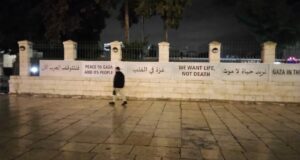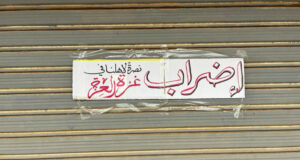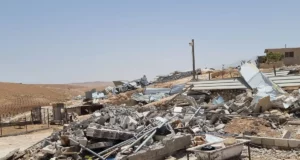By The ISM Media Team
Wednesday, June 13, 2007 6:30—9 pm
A 21-year old Palestinian male was detained at the Tel Rumeida Hill at 6:30 p.m. for not having his Palestinian id (hawiya). He told the soldiers that he forgot it at home.
The detainee’s brother was told to go home by the soldiers to retrieve the id so they could check it. When the group of soldiers told him to go home and bring them back his brother’s id, he told the soldier he wanted to stay with his brother. There was innitialy a discussion over whether the boy should go home to get the ID or not however this discussion escalated and the soldier became aggressive and grabbed the boy. At this point the soldier dragged the Palestinian boy to one side to continue speaking with him. When the soldier became aware that the HRWs present were filming and watching the situation, the soldier attempted to move the boy round the side of a nearby house, out of the line of vision of the HRWs. There was serious concern for the safety of the boy especially due to the aggressive nature of the soldier and the attempts by the soldier to remove him from view of the cameras. When the HRWs attempted to move to a position where they were able to view what was going on, other soldiers began to block them. It could be seen however that the boy had been pushed up against the wall whilst the soldier was still speaking to him in a threatening manner. Eventually the soldier let go of the boy and allowed him to leave to get his brothers ID.
When an international HRW, who spoke fluent Arabic, asked the detainee about his ID, he said was currently waiting to receive a new ID. His previous one was ruined in the washing machine and he had taken it to the Palestinian police for a new one. The Palestinian police told him to return for a new ID in two to three days.
An Israeli soldier told the HRWs that because the detainee had his id taken by the Palestinian Police that it usually means there is some sort of problem. He did not believe that it was a problem of the young man needing to get a new id.
The brother of the detainee returned with an old photo ID, of his brother, stating his full name and ID number in Arabic. The soldier could not speak Arabic and needed the HRW to translate his questions for the detained Palestinian.
First the soldier asked if this was the current number of the detainee’s ID and then had the young man read him the numbers. The soldier then phoned in the Palestinian’s ID number and was told that this number was in error. The soldier asked the detainee to re-read the numbers and realized that the first time he had read them backwards.
The soldier then asked the Palestinian for the name of his father and grandfather. The soldier told the international that they were not finding a match between the number and the name and that was a problem. While waiting, the soldier told the HRW that the id card was not enough and could be a fake. The soldiers told the detainee that if he was cold, he could sit in the soldiers post but the young Palestinian man refused.
At this point the young man had been detained for 2 hours. The soldiers said that they had to wait for conformation, or “orders” to release the young man. Every time they called the station, however, they did not receive conformation. Internationals had been calling the Red Cross and ACRI throughout the incident, as well as the police (although they hung up multiple times). After two hours the Red Cross called the police, and they finally arrived.
When the police came they took the id of the detainee’s brother and the identification card of the detainee. The police asked of both young men the name of their father, grandfather, and mother. After the young men had answered the police then separated the brothers to ask them the same questions separately to see if they were really brothers.
They told the detainees brother to walk a short way away and then asked the young man the names of their siblings, where they lived and with who, and the occupation of their father. The police then called the detainees brother back and asked him the same questions.
After this, the officer told the detainee that not having an ID is a big problem and to save himself and others trouble, and take his ID with him wherever he goes. The officer told him that if he is going to go anywhere, where he knows there are soldiers, bring his ID, because they will never know when their IDs will be checked.
The officer also told the young Palestinian man that it took a long time for the soldiers to do background checks because they do not have a computer and it only takes the police a few minutes.
 International Solidarity Movement Nonviolence. Justice. Freedom.
International Solidarity Movement Nonviolence. Justice. Freedom.


